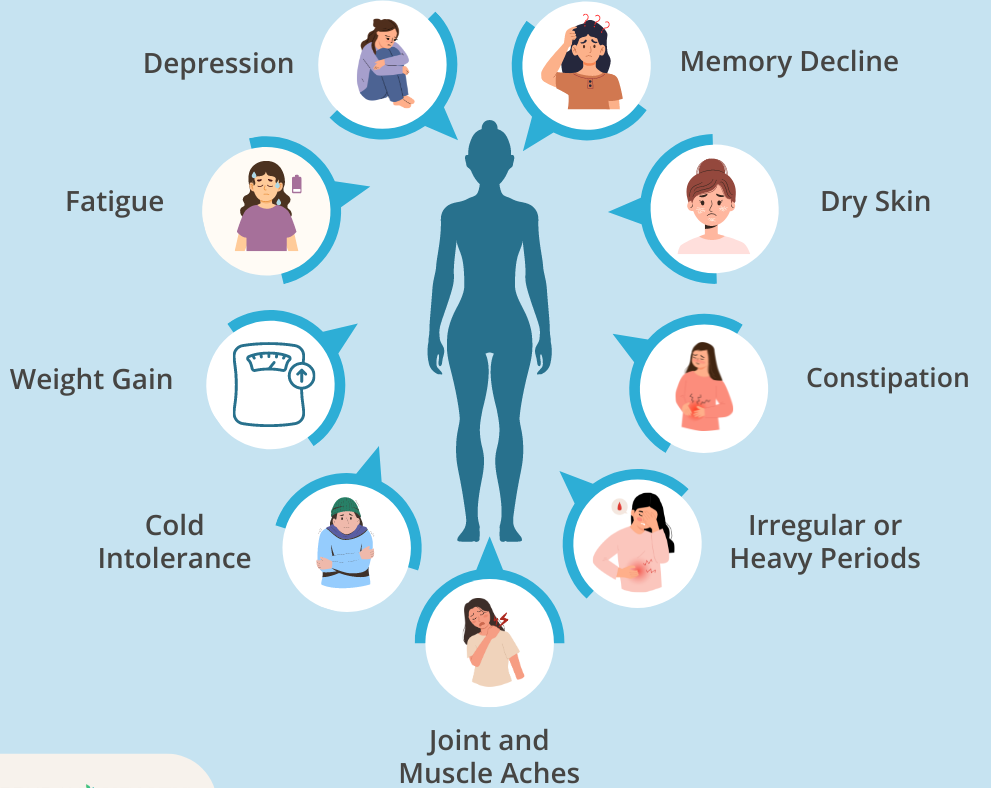You’ve probably heard the term “thyroid disease” quite often.
But did you know that thyroid disorder isn’t just one condition? It includes several issues like hypothyroidism, hyperthyroidism, goiter, nodular goiters, and even thyroid cancer.
Today, we’ll focus on one of the most common conditions — Hypothyroidism — a condition that often goes undiagnosed for years, with people mistaking its symptoms for lifestyle issues like fatigue or stress.
Even those diagnosed with hypothyroidism may not realize how deeply it affects their overall health until they begin treatment and start to feel the difference after a few months.
Let’s explore everything you need to know about hypothyroidism in five key sections:
1. Who is at Risk of Hypothyroidism?
Hypothyroidism can affect anyone — from newborns to the elderly. It’s especially concerning during pregnancy because untreated hypothyroidism in expectant mothers can lead to developmental issues and low IQ in babies. This is why thyroid testing is routine during pregnancy.

What causes it?
-
Autoimmune disorders like Hashimoto’s thyroiditis — where the immune system attacks the thyroid gland.
-
Environmental triggers like iodine imbalance or selenium deficiency.
-
Genetics – If your parents or siblings have thyroid problems, your chances are higher.
-
Dietary habits, especially diets rich in iodine (common in some regions like Japan).
In short, anyone can develop hypothyroidism, which is why understanding the symptoms is crucial for early detection.
2. Symptoms and Warning Signs of Hypothyroidism
The thyroid gland produces hormones that regulate your body’s metabolism. When it underperforms (as in hypothyroidism), your entire system slows down.

Here are the common symptoms — many of which can be mistaken for everyday fatigue:
-
Persistent tiredness or low energy
-
Difficulty concentrating or feeling mentally “foggy”
-
Dry, brittle hair and nails
-
Weight gain, even with reduced appetite
-
Irregular or heavy menstrual cycles in women
-
Infertility or reduced libido
-
Puffy face and swelling in hands, feet, and around the eyes
-
Joint stiffness or muscle aches
-
Cold intolerance (feeling cold easily)
-
Pale skin and anemia
-
Slowed heart rate and high blood pressure
-
Poor memory and hearing difficulties
-
High cholesterol levels
Most of these symptoms are non-specific, which is why many people live with hypothyroidism for years without knowing they have it.
3. How is Hypothyroidism Diagnosed?
Diagnosis primarily involves a simple blood test that checks your TSH (Thyroid Stimulating Hormone) levels.
-
In hypothyroidism, TSH levels are elevated — because your body is trying to stimulate a sluggish thyroid.
-
T3 and T4 hormones (thyroid hormones) may appear normal in early stages, so TSH is the most reliable indicator.
Many lab reports focus on total T3 and T4, but free T4 levels are more accurate in assessing thyroid function. However, TSH remains the most important number for treatment decisions.
4. What is the Treatment for Hypothyroidism?

The primary treatment is levothyroxine (synthetic thyroid hormone).
Important notes on treatment:
-
Hypothyroidism is usually permanent. The damaged thyroid gland cannot heal, so lifelong hormone replacement is needed.
-
The medication dose is tailored and often requires 6–8 weeks of monitoring and adjustments, especially in the beginning.
-
After stabilization, an annual checkup is recommended.
You must take the medication on an empty stomach, ideally 30 minutes before breakfast. Do not take it with calcium, iron, or other medications, as these can affect absorption.
If you miss a dose, you can take two tablets the next day (only occasionally). The medicine has a long half-life (7 days), so short-term lapses won’t cause immediate harm — but don’t make it a habit.
It typically takes 3 to 6 months after treatment begins for energy levels and symptoms to improve.
5. What Should Thyroid Patients Keep in Mind?
If you are on thyroid medication:
-
Take it consistently every day on an empty stomach.
-
Avoid combining it with other supplements or medications that affect absorption.
-
Do not skip doses regularly or stop the medication on your own — this is a lifelong condition.
-
Regular blood tests are essential for dosage adjustments — every 2 months initially, and then once a year if stable.
-
Elderly patients or those with heart issues need more frequent monitoring as the medication can affect heart function.
-
Pregnant women must strictly follow their prescribed dose as thyroid hormones are critical for fetal development.
Final Thoughts
Hypothyroidism is common yet easily overlooked, as its symptoms mimic everyday fatigue, mood swings, and weight issues.
Understanding this condition is not just essential for those who are diagnosed, but also for anyone experiencing unexplained symptoms. A simple blood test could save you years of fatigue and imbalance.
Early diagnosis and regular treatment can help you live a healthy, symptom-free life. If you suspect you might have thyroid issues — don’t wait. Get tested.